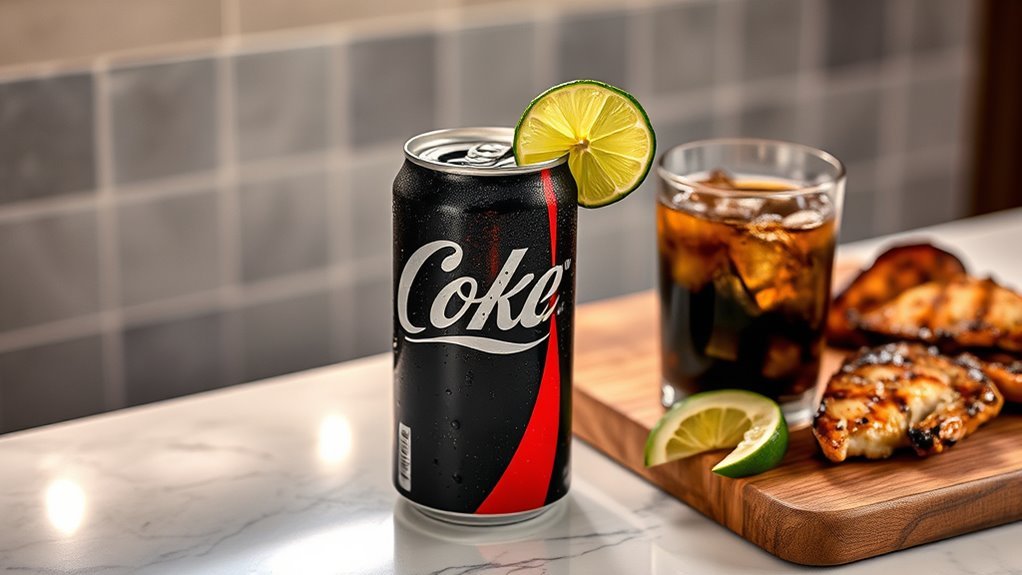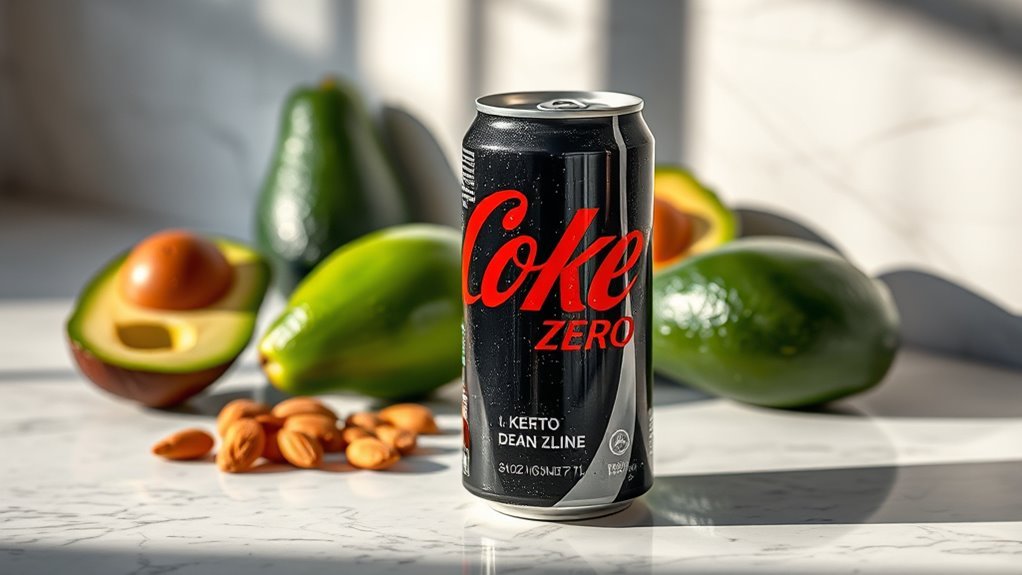Coke Zero can fit into your keto diet since it has zero carbs and calories, making it an appealing choice for low-carb lifestyles. However, be mindful of the artificial sweeteners like aspartame, which may affect insulin responses and cravings. While it won’t derail your dietary goals, it’s essential to monitor how your body reacts. If you’re curious about the alternatives and different options available, you’ll find plenty of insights ahead.
Understanding the Keto Diet

When you commence a keto diet, you’re fundamentally shifting your body into a state of ketosis, where it burns fat for fuel instead of carbohydrates. This metabolic change offers several keto benefits, including weight loss, increased energy levels, and improved mental clarity. Many people experience a significant reduction in cravings, allowing for greater food freedom. However, it’s essential to acknowledge the keto challenges. Adapting to this new way of eating can lead to symptoms like fatigue, irritability, or the so-called “keto flu” during the initial phase. Staying informed and preparing for these hurdles can help you succeed in your journey. Embrace the transformative potential of the keto diet while being aware of its demands to navigate it effectively.
Nutritional Information of Coke Zero

As you explore beverage options on a keto diet, understanding the nutritional profile of Coke Zero can be helpful. This calorie-free drink may seem appealing, but it’s important to evaluate its overall impact on your diet. Here are some key points:
- Caloric Content: Coke Zero has zero calories, making it a popular choice for those monitoring caloric intake.
- Carbohydrates: It contains no carbohydrates, which fits well within keto guidelines.
- Artificial Sweeteners: The use of sweeteners might affect your cravings or appetite differently.
When making beverage choices, it’s vital to weigh the benefits and potential downsides. While Coke Zero can be a rejuvenating option, remember that moderation and personal responses to artificial ingredients are key to maintaining freedom in your dietary journey.
Ingredients Breakdown

Understanding the ingredients in Coke Zero is essential for anyone contemplating it as part of their keto diet. Coke Zero contains carbonated water, caramel color, phosphoric acid, aspartame, potassium benzoate, and natural flavor additives. The primary ingredient sources are synthetic sweeteners like aspartame and acesulfame potassium, which provide sweetness without adding carbs. These sweeteners are commonly used in diet sodas, making them appealing for keto dieters. However, it’s crucial to highlight that while they contain no sugar or calories, some individuals may experience digestive issues or prefer to avoid artificial ingredients altogether. The flavor additives enhance the beverage’s taste, but if you value whole food sources, you might want to explore alternatives. Always make informed choices that align with your dietary goals.
Carb Count and Its Impact
Coke Zero contains zero carbs, making it an attractive option for those following a keto diet. By avoiding carb sources like sugar, you can stick to your macro goals while enjoying a revitalizing beverage. Here are some reasons Coke Zero fits well into your keto lifestyle:
- No carbs: Helps maintain your daily carb limit.
- Low-calorie: Offers a guilt-free alternative to sugary drinks.
- Variety of flavors: Keeps your beverage options exciting.
When considering keto beverages, Coke Zero stands out due to its carb-free nature. This means you can indulge in a fizzy drink without derailing your dietary goals, giving you the freedom to enjoy your favorite flavors while staying committed to your keto journey.
Artificial Sweeteners in Coke Zero
While you might enjoy the taste of Coke Zero, it’s important to contemplate the artificial sweeteners that give it its flavor. Coke Zero primarily uses aspartame and acesulfame potassium. These sweeteners can satisfy your taste preferences without the sugar, but they also come with health concerns. Some studies suggest potential links between artificial sweeteners and metabolic issues, though the evidence isn’t definitive. If you’re mindful of your health, it’s wise to weigh these concerns against your enjoyment of the drink. Ultimately, your choice depends on how you prioritize taste versus potential effects on your well-being. Staying informed helps you make decisions that align with your lifestyle and dietary goals, especially when steering through a keto-friendly regimen.
Effects on Ketosis
Artificial sweeteners like aspartame and acesulfame potassium can be a point of concern for those following a keto diet, as they may influence ketosis in ways that aren’t immediately obvious. While Coke Zero is low in calories and carbs, its ingredients can have varying effects on your body.
- Some studies suggest artificial sweeteners might trigger insulin responses.
- Others indicate they could lead to cravings for sugary foods.
- Individual responses to sweeteners can differ greatly.
These ketosis effects mean that Coke Zero might not be ideal for everyone on keto. It’s essential to monitor your body’s reactions and adjust your intake as needed. Ultimately, staying informed and listening to your body can empower you to make the best choices for your health journey.
Alternatives to Coke Zero on Keto
If you’re looking for alternatives to Coke Zero while sticking to a keto diet, several options can satisfy your cravings without jeopardizing your ketosis. Diet sodas like Diet Pepsi or Sprite Zero can be good substitutes, offering the fizz and flavor you love without carbs. Additionally, sparkling water infused with natural flavors gives you a revitalizing option, complete with health benefits like hydration. If you’re up for something different, unsweetened iced tea or coffee can deliver satisfying taste without added sugars. Just remember to read labels for any hidden carbs or sweeteners. With these choices, you can enjoy your beverage freedom while adhering to your keto lifestyle.
Frequently Asked Questions about Coke Zero and Keto
1. Is Coke Zero suitable for a keto diet?
Yes, Coke Zero is generally considered suitable for a keto diet. It contains zero calories and zero carbohydrates, which means it won’t impact your daily carb limit. However, it’s important to consume it in moderation and be aware of individual responses to artificial sweeteners.
2. What are the main ingredients in Coke Zero?
Coke Zero contains carbonated water, caramel color, phosphoric acid, aspartame, potassium benzoate, caffeine, and natural flavors. Notably, it uses artificial sweeteners like aspartame and acesulfame potassium to provide sweetness without calories.
3. Can Coke Zero affect ketosis?
Coke Zero is unlikely to affect ketosis directly, as it contains no carbohydrates or sugars. However, some individuals may experience cravings or appetite stimulation from artificial sweeteners, which could indirectly influence their adherence to a keto diet.
4. Are there any health concerns with drinking Coke Zero on keto?
While Coke Zero can fit into a keto diet, consuming it regularly may raise concerns due to its artificial ingredients and sweeteners. Some studies suggest that artificial sweeteners may affect gut health or insulin sensitivity in certain individuals. It’s essential to balance your intake of beverages like Coke Zero with plenty of water and other whole foods.
5. Can I drink Coke Zero while intermittent fasting on a keto diet?
Many people who follow intermittent fasting on a keto diet choose to drink Coke Zero during their fasting window, as it has no calories or sugars. However, if your fasting goal is related to metabolic health or autophagy, some experts advise avoiding artificial sweeteners, as they may trigger an insulin response in some individuals.
References
- https://www.healthline.com/nutrition/coke-zero-keto
- https://www.verywellfit.com/coke-zero-and-the-keto-diet-5193038
- https://www.ncbi.nlm.nih.gov/pmc/articles/PMC6466372/
- https://www.nutrition.gov/topics/nutrition-101/what-ketogenic-diet
- https://www.reuters.com/article/us-health-keto-diet-idUSKBN1WZ1I3
- https://www.medicalnewstoday.com/articles/what-is-the-keto-diet
- https://www.sciencedirect.com/science/article/pii/S0899900719306601


